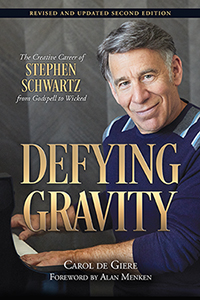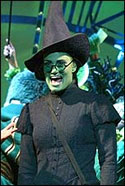Wicked Study Guide
for Teachers, Students, and Fans
 An independent resource guide for teaching, writing papers, or just learning about Wicked the musical
An independent resource guide for teaching, writing papers, or just learning about Wicked the musical
If you missed the Wicked home page, check there for all things Wicked.
General Questions and Answers about Wicked to consider
(Music teachers - see music section below)
1. How did Wicked the musical begin?
 It was Stephen Schwartz's idea to turn Gregory Maguire's novel into a musical. Carol de Giere's biography of Wicked's composer Stephen Schwartz reveals the full story in the first of 14 chapters about the show. Here is a PDF of that chapter ."Landing in Oz" - How Wicked got started in Defying Gravity [PDF file opens in a new window. Used with permission.] Enjoy the full book with 15 chapters on Wicked:
It was Stephen Schwartz's idea to turn Gregory Maguire's novel into a musical. Carol de Giere's biography of Wicked's composer Stephen Schwartz reveals the full story in the first of 14 chapters about the show. Here is a PDF of that chapter ."Landing in Oz" - How Wicked got started in Defying Gravity [PDF file opens in a new window. Used with permission.] Enjoy the full book with 15 chapters on Wicked:
DEFYING GRAVITY and BOOKS on WICKED
2. What is a backstory? See definition on dictionary.com. Wicked tells the "backstory" of The Wizard of Oz.
3. What was the relationship of Gregory Maguire's backstory for The Wizard of Oz to the musical?
Related question: Why didn't Wicked's writers include more characters?
Maguire had created, as the author himself described it, "...a thick, treacly porridge of a novel that takes place over thirty-eight years and has thirty-eight speaking parts." Maguire's readers could take leisurely trips through the twisting passageways of his tale.
Musical viewers needed a condensed version of the story. "It has so much plot; it's all over the place," Schwartz once commented about the novel. "It wasn't simply a matter of cutting. It was a matter of taking the basic idea and re-examining it—of letting go of some of the pieces and yet staying true to the essence." from the Stephen Schwartz biography DEFYING GRAVITY
See Character page for a comparison of characters. Also see Maguire page
For a synposis of the musical without spoilers - see Songs in context page. For a complete synopsis of the musical with spoilers (don't read this if you want to enjoy the surprises of the show) Wicked__the_synopsis.html
4. Why is Winnie Holzman called a book writer when Gregory Maguire wrote the novel? In musical theatre, scripts are called the "book" of the musical. Their authors are called book writers (sometimes spelled bookwriters). Read all about Winnie Holzman.
5. Wicked the musical was created as a collaborative effort. Discuss what that might mean? Visit the Who's Who page - Creative team section for a list of key players. Why does Stephen Schwartz compare it to Rowling's work on Harry Potter? See quote towards the end of the Wicked-history page.
6. What are some of the messages of the musical?
Stephen Schwartz's comment when asked if he was inspired by the movie: "I think it's hard to imagine any kid who has a passion for musicals not being affected upon seeing THE WIZARD OF OZ. But I think what appealed to me more, when I first came across Gregory Maguire's novel and was immediately smitten with the desire to adapt it as a musical is the theme, one which has always fascinated me: Looking at a familiar story or characters from a different point of view, and thus revealing that life is not as simple or as black-and-white as we tend to think. That and the fact that I have always been interested in stories of people who are perceived as "different" and feel themselves alienated from "normal" society. Many of my other shows deal with these themes, but WICKED seemed to me almost the perfect embodiment."
 7. What other musicals or movies talk about characters who feel different or who are treated as out-of-the-norm? Most of musicals Stephen Schwartz has been involved with touch on this theme (e.g. The Hunchback of Notre Dame). Can you think of others? (That's an open question). Why is that important? (Also see Teaching Tolerance section later on this Web page.)
7. What other musicals or movies talk about characters who feel different or who are treated as out-of-the-norm? Most of musicals Stephen Schwartz has been involved with touch on this theme (e.g. The Hunchback of Notre Dame). Can you think of others? (That's an open question). Why is that important? (Also see Teaching Tolerance section later on this Web page.)
8. Wicked is also about friendship. Early in the show, there's a song about Glinda and Elphaba loathing each other. Read the story behind "What is This Feeling". The girls become friends as expressed in "Popular," when Glinda tries to give her new green roommate a makeover. In the middle of the show they part ways and even fight. But at the end they sing "For Good" together. Their relationship evolves through time. This topic is worthy of discussion.
Here's what Schwartz says about "For Good": The song "For Good" was, of course, written for the show to try to express the leading characters' feelings as they are seeing each other for the last time. The title came out of a brainstorming conversation I had with Winnie Holzman (the book writer) -- basically at one point she said it should be about how the two of them had changed each other "for good", at which point, hearing the amazing possibilities in that phrase, I knew I had found the title for the song. To get some of the content, I had a long conversation with my daughter, in which I asked her what she would say to her best friend (someone she has known pretty much all her life), if she knew she was never going to see her again. A lot of what Jessie said got transformed into the first verse of the song. Other than that, it was simply trying to put myself into the hearts and minds of the characters and see what they said.
9. Imagine being green. What synonyms or similes do Gregory Maguire, Winnie Holzman, and Stephen Schwartz use for Elphaba's greenness?
phosphorescent [link to def. at dictionary.com],
verdigris - [link to def. at dictionary.com].
Anything else? What about at her birth in "No One Mourns the Wicked"?
Read about how Idina Menzel becomes green - green make up. Article posted on wickedthemusical.com Green make up
10. In "The Wizard and I," Elphaba sings "This weird quirk I've tried to supress or hide, is a talent that could..."
How would you finish this sentence for yourself?
OR consider this: Did Elphaba get discouraged about her talents along the way? Did her talents prove helpful in the end? Compare her feelings while she's singing "No Good Deed" to the benefit she brought to the talking Animals
Also see our Wicked shop for Wicked posters and other materials
Study guide for Wicked the novel: www.bookrags.com/Wicked_(novel)
For Music Teachers and Students
You might want to subscribe to The Schwartz Scene free newsletter and read back issues.
Wicked's score is full of musical themes and even a few homages to the Wizard of Oz score. Can you find them? See Wicked Musical Themes for a hint.
"Popular" is a list song. Can you name other list songs by Stephen Schwartz or other songwriters? What about "The Naming" from Children of Eden? Rodgers and Hammerstein's "My Favorite Things" and Cole Porter's "You're the Top"? What would you write a list song about?
Visit the many links on the Wicked Music page.
 Order the Wicked CD - original Broadway cast recording for the musical Wicked: $13.49 (List price $18.98). Now available. Amazon.com - Wicked CD [new browser window] (Wicked soundtrack) .
Order the Wicked CD - original Broadway cast recording for the musical Wicked: $13.49 (List price $18.98). Now available. Amazon.com - Wicked CD [new browser window] (Wicked soundtrack) .
Teaching Tolerance
Wicked teaches tolerance.
From Teaching Tolerance
"A stereotype is an exaggerated belief, image or distorted truth about a person or group — a generalization that allows for little or no individual differences or social variation. Stereotypes are based on images in mass media, or reputations passed on by parents, peers and other members of society. Stereotypes can be positive or negative.
A prejudice is an opinion, prejudgment or attitude about a group or its individual members. A prejudice can be positive, but in our usage refers to a negative attitude.
Prejudices are often accompanied by ignorance, fear or hatred. Prejudices are formed by a complex psychological process that begins with attachment to a close circle of acquaintances or an "in-group" such as a family. Prejudice is often aimed at "out-groups."
Discrimination is behavior that treats people unequally because of their group memberships. Discriminatory behavior, ranging from slights to hate crimes, often begins with negative stereotypes and prejudices.
How do we learn prejudice?
Social scientists believe children begin to acquire prejudices and stereotypes as toddlers. Many studies have shown that as early as age 3, children pick up terms of racial prejudice without really understanding their significance.
Soon, they begin to form attachments to their own group and develop negative attitudes about other racial or ethnic groups, or the "out-group". Early in life, most children acquire a full set of biases that can be observed in verbal slurs, ethnic jokes and acts of discrimination."
